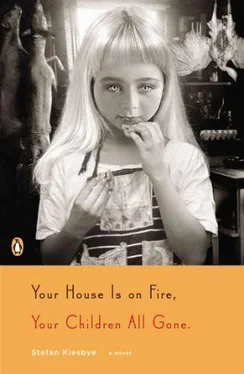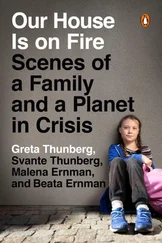When the undertaker has gone and the black hearse is back on its way to Groß Ostensen, Linde steps closer to the headstone, inspects the inscription, and rounds the grave, as though to make sure that Anke won’t be able to get out. Her dress is as gaudy as the wreath, only its colors are more washed out. Loudly she coughs up some phlegm and spits it out. “You piece of shit,” she says. “There you go.” She stomps around on the loose soil.
Alex steps toward her, talks to her, tries to lead her away from the grave, but Linde shakes off his arm. “Go fuck yourself, Alex. Don’t get all holy on me now. You couldn’t stand her.” When he still won’t leave her, she slaps him in the face. She has to get up on her toes to do it. “Don’t touch me again,” she says. “You killed her.” With legs wide apart, she bends over, hikes up her skirt, shows us that she isn’t wearing any underwear, and pisses onto the grave. Alex shakes his head and brushes his suit with his hands as though it suddenly has become dirty. Martin turns away without a word and walks toward his van. Alex raises one hand and shouts, “Stop by the inn tonight,” but Martin doesn’t react. Surely he doesn’t want to have heard.
“Done,” Linde finally says, then lets down her skirt and straightens it. Angrily she stares after Martin’s van, until a tiny smile scurries over her face. “The coffin should have had a window. A large, round window. Hell, the whole lid should have been made from glass.” Once more, she steps toward the grave and looks at what she’s done. “I just hope she can see me from hell.” The smile spreads on her face. You could almost call her beautiful.
In September we celebrated Thanksgiving in Hemmersmoor,{German Thanksgiving is celebrated in late September or early October.} and mass was followed by festivities at Frick’s. In the afternoon, after beer stuck to every surface, the villagers spilled into the square to take part in the yearly cooking contest.
“For the first one death, for the second starvation, for the third one bread”—that old proverb described the colonization of the Devil’s Moor, but our bread remained as hard and gray and sour as our soil.
To enter the cooking contest was costly, because the rules stated that each dish had to feed at least four dozen people. Hemmersmoor had three categories: best stew, best roast, and best Butterkuchen , the buttery, sugar-sprinkled sheet cake our baker, Meier, was famous for and that he sold for funerals and weddings alike. Meier always won the contest, uncontested that is, because who would dare go up against him?
The stew contest was, for the imaginary outsider—there were never any real outsiders present during the cooking contest—an unappetizing affair. You need to have lived in the North to appreciate Labskaus , an old sailor dish, or Pears, Beans, and Bacon, another favorite.
The roast contest was maybe our favorite, and the more contestants entered, the better the feast that followed in the village square. Nobody in the village could resist the doctor’s wife’s pork roast or help stuffing themselves with beef dished out by the mailman’s wife. And this year the competition was unusually fierce and promising. Four families had entered the stew contest, five the roast contest, and Meier faced his first rival in fifteen years—my mother, Käthe Schürholz.
Fueled by compliments on her Butterkuchen —my father, the Gendarm , insisted it could compete with any cake anywhere—my mother, with fingers trembling and her hair refusing to stay curled, announced her entry the week before Thanksgiving.
During the days leading up to the contest I stayed in school as long as I could, then went home with one friend or another. If Alex had to help at his father’s inn and Christian was nowhere to be found, I followed Anke Hoffmann to her house and played all afternoon with her and Linde Janeke. Patiently I combed the hair of their dolls and listened to stories about cursed princes and princesses immortally in love with young men of low birth, only so Mrs. Hoffmann would invite me for dinner. All the dolls had names. Some were called only Dolly or Baby, but the better ones had names like Rosemarie and Kunigunde. Two of the dolls looked very similar, and both wore flowered dresses; they were Anke and Linde. The real girls almost looked like twins, and they often wore the same colors to heighten that impression. But Anke wore shiny barrettes and necklaces, and her shoes always looked freshly polished. Even her dolls looked more glamorous than Linde’s, and she had twice as many as her friend and a whole drawer full of dresses for them. She insisted that her dolls wear fresh clothes daily.
I never mentioned those afternoons to Christian or Alex, and hoped the girls and Anke’s brothers wouldn’t tell on me. Yet each day I stayed as long as the Hoffmanns would have me. Only after nightfall did I return home, and neither my father nor my mother ever noticed my absence.
Each day my mom baked several small sheets of cake, trying to improve on the moistness of the dough, its texture, butteriness, or even the way to sprinkle it with sugar. If she noticed me at all in those days, it was only to put a plate with a large piece of Butterkuchen in front of me. “Try it, Martin,” she’d say, but I couldn’t enjoy the treat. One false expression on my face would bring her to tears; no praise would appease her.
My sister, Birgit, was thirteen, almost twice my age, and usually out with some boy or other. But now she was forced to help, which she did with a face so frightened and serious, with eyes so large and wide, she appeared to have seen a ghoul; one false move and they might pop out and roll under the cupboard.
My father followed my example and stayed away as much as possible. He preferred a drunken brawl, a burglary, or even assault to the murderous atmosphere that had befallen our home, where the kitchen light stayed on long after midnight. After hours I picked him up at Frick’s, where his uniform bought him as many drinks as he needed. “Of course I complimented her,” I heard him lament on one of these occasions. “That’s what I’m supposed to do. If I don’t tell her how delicious her cake is—every single time—she thinks I’m ungrateful. If I want cake, I have to encourage her.”
Peter Brodersen, whose own wife would take part in the roast contest, put one of his big hands consolingly on my father’s shoulder.
“It’ll be okay,” Jens Jensen, the old peat cutter, said.
“It won’t,” my father sighed. “Her cake is fine for us, but it’s not Meier quality. When she loses, I won’t eat anything but dry bread for weeks. Her honor, her confidence—she’ll be humiliated, laughed at. She’ll never be able to set foot in Meier’s bakery again.”
New people in Hemmersmoor were regarded with suspicion, and you stayed new until well after you’d lived in our village for twenty years, possibly forever. Our neighbor Bernd Fitschen, who arrived in Hemmersmoor when he was a toddler, and whose sparse hair was now white, and who had great-grandchildren my age, was still called “the foreign Bernd.” He’d moved here from Groß Ostensen, a city twenty kilometers to the east.
New people were supposed to fit in and keep a low profile and not draw any attention to themselves. So Helga Vierksen’s entry to both the stew and roast contest, in only her third year in Hemmersmoor, would normally have raised eyebrows. Not this year though; this year my mother’s herculean task took center stage and left the quick tongues of Hemmersmoor little time for other topics.
The shadows around my mom’s eyes grew wider and darker, and her expression changed from euphoria to hopelessness in a fraction of a second. Friday night, two days before the contest, I heard her cursing herself in the kitchen. “You couldn’t stay, could you, you vain hag?” she asked. “How Heidrun, Bertha, and Gertrude—how the whole village will laugh at you!”
Читать дальше












